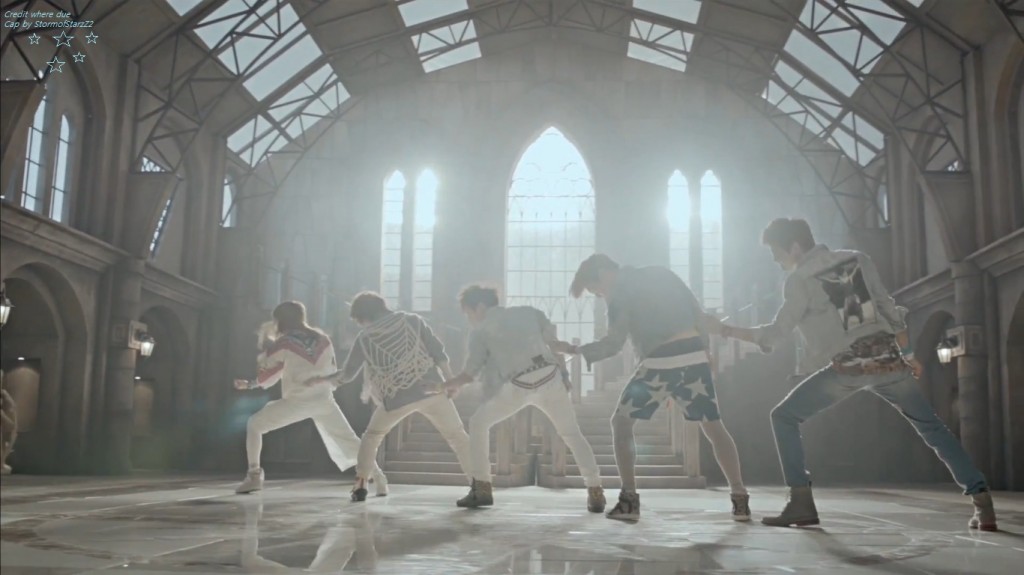 By K-pop standards I am quite the lazy fan. I don’t buy my favorite group’s album the very second it comes out. I have yet to purchase a tee-shirt with my biases’ faces on it. I’m terribly too apathetic to check daily who’s dominating whom on the K-pop charts. And I never, ever re-watch my favorite group’s video on Youtube for the sake of upping the view count. That last one has nothing to do with a moral distaste for the practice and everything to do with the fact that frankly, I gots better things to do with my time. How many times have you watched a new SHINee video only to see countless comments telling viewers that we must reach 20 million views before Friday? I always think, we must? Why must we?
By K-pop standards I am quite the lazy fan. I don’t buy my favorite group’s album the very second it comes out. I have yet to purchase a tee-shirt with my biases’ faces on it. I’m terribly too apathetic to check daily who’s dominating whom on the K-pop charts. And I never, ever re-watch my favorite group’s video on Youtube for the sake of upping the view count. That last one has nothing to do with a moral distaste for the practice and everything to do with the fact that frankly, I gots better things to do with my time. How many times have you watched a new SHINee video only to see countless comments telling viewers that we must reach 20 million views before Friday? I always think, we must? Why must we?
I just don’t understand the appeal or benefit of a person spending hours cranking up view counts for their favorite artists. I’ve touched on this topic before, to which a couple of adamant commentors explained to me why Youtube views actually do matter. So in second-guessing my indifference towards K-pop fans’ obsession with Youtube view counts, it’s about time I do some research on why video view counts are important–or not–to K-pop artists.
Depending on who you ask, the most viewed K-pop MVs on Youtube are the Wonder Girls‘ “Nobody,” SNSD‘s “Gee,” Big Bang and 2NE1‘s “Lollipop,” and Super Junior‘s “Sorry Sorry”. But accurately tallying up views can be tricky business since multiple users take it upon themselves to upload videos to their unofficial channels. As a consequence, some idol groups end up having hundreds of thousands of views divided across several channels. For hardcore fans, this is a big no-no. I can’t tell you how many times I’ve been yelled at by fellow netizens for watching a group’s video on the wrong Youtube channel.
For the past few years, entertainment companies have begun managing their own Youtube channels as a way to better control their content and to direct viewers to official videos. But more important than that, companies make a profit from the videos that they post. The more views they get, the more ad revenue they receive. Imagine having a fanbase that’s constantly refreshing their browsers to give their favorite idol groups views into the millions–it can add up to a significant amount of money! But where does that money go? There’s a fairly common belief that the ad money goes towards supporting the artists. I’ll make the conjecture that artists don’t benefit monetarily from Youtube views, at least not directly. That money is probably going straight into the pockets of entertainment companies.
So if fans are not supporting their idols monetarily through view counts, how are the millions of views going to good use? Well for one, Youtube has a system that rewards highly-viewed videos by placing them on the site’s “Most Viewed” section on the homepage. This is huge in making that group visible to a global audience. More visibility means more people potentially becoming fans of that group and willing to support them. The power that fans hold to give their artist a significant platform is both satisfying and extremely beneficial to a group’s popularity.
But this is a double-edged sword. Once you place your favorite K-pop MV on such a global stage, it (and its fans) are subject to criticism. International Youtubers outside of K-pop don’t take well to videos they think don’t deserve a spot on Youtube’s homepage. They’re turned off by comments blatantly instructing others how to reach millions of views. And they’re unaccustomed to the overzealous nature of K-pop fans who falsely think page views are a reflection of a group’s popularity.
If anything, supporting K-pop groups through increasing Youtube views is more satisfying for international fans than it is for anyone else. Cranking up view counts gives international fans an almost tangible goal in supporting their favorite groups. Lacking the ability to attend concerts, music shows, or even to understand the language, Youtube is a vehicle for international fans to be closer to their idols and to express to their biases the sentiment, “We’re all over the world and we love you enough to spend all this time making your MV the top MV in the world.” And let’s not forget the bragging rights. When an idol group hits a monstrous amount of views in a short number of days, fanclubs not only get to say “My group is much more talented than yours, and so are the fans” but they also get to sit back and enjoy all of the media articles that are written about the feat.
I’m still not totally convinced that Youtube views are incredibly, life-alteringly important. I do, however, think that if anything is significant, it’s the ratio of likes to dislikes on a video. These days, that number is more telling than viewcounts. What do you all think about fans who constantly replay Youtube videos for the sake of upping views? Is it unnecessary or am I missing something here?






